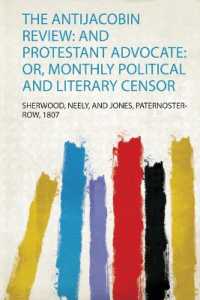Full Description
As our understanding of learning focuses on the whole person rather than individual aspects of learning, so the process of learning is beginning to be studied from a wide variety of perspectives and disciplines. This handbook presents a comprehensive overview of the contemporary research into learning: it brings together a diverse range of specialities with chapters written by leading scholars throughout the world from a wide variety of different approaches. The International Handbook of Learning captures the complexities of the learning process in seven major parts. Its 54 chapters are sub-divided in seven parts:
Learning and the person: senses, cognitions, emotions, personality traits and learning styles
Learning across the lifespan
Life-wide learning
Learning across the disciplines: covering everything from anthropology to neuroscience
Meaning systems' interpretation
Learning and disability
Historical and contemporary learning theorists.
Written by international experts, this book is the first comprehensive multi-disciplinary analysis of learning, packing a diverse collection of research into one accessible volume.
Contents
Introduction: Learning - an overview
Part 1 Learning and the Person
Senses
Cognitions
Skills and roles
Emotions
Embodiment
Gender
Identity
Personality, Personality Traits and Learning Styles
Non-learning
Part 2 Learning across the Lifespan
Prenatal and the First Year
Early Childhood
The School Years
Adolescence
Adulthood
Mid-life
Older Adults
Biography
Development
Part 3 Learning across the Disciplines
Philosophy
Ethics e.g. indoctrination, socialisation
Psychology - cognitive and evolutionary
Sociology
Anthropology
Politics
Geography/Cultural differences
Biology - evolution and genetics
Pharmacology
Neuroscience
Physiology
Part 4 Meaning Systems' Interpretation
Buddhist
Christian
Confucianism
Hindu
Islamic
Jewish
Part 5 Learning Sites
Informal learning - everyday living
Formal learning - school
Non-formal learning - work
Learning and the inter-relationship of the sites of learning in everyday living
Self-directed learning
e-learning
Part 6 Learning and Disability
Physical disabilities
Autism, dyslexia and dyscalculia and other learning difficulties
Part 7 Historical and Contemporary Learning Theorists
Pavlov, Watson, Skinner
Piaget
Vigotsky
Dewey
Bruner
Gardner
Jarvis
Illeris
Mezirow
Engestrom
Concluding Discussion








